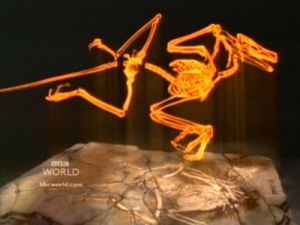Horizon
The Dinosaur that Fooled the World (2002x7)
: 21, 2002
In the mid 1800s, when Charles Darwin published his theory of evolution, one species of animal remained a mystery; where did birds fit on his evolutionary tree? Several years later his friend and colleague, Thomas Henry Huxley, came up with an answer. Huxley had recently examined a new fossil from southern Germany called Archaeopteryx which was causing considerable excitement in palaeontological circles. There were clear signs of feathers and it was obvious this was the earliest fossil evidence of a bird ever found. Huxley noticed something else as well. To him it looked as though the skeleton bore a striking similarity to that of a family of meat eating dinosaurs known as therapods.
In the 1860s, on the basis of this observation, he announced a new theory; birds must have evolved from dinosaurs. The theory ignited what was to become one of the biggest controversies in palaeontology. Could Huxley possibly be right; how could a large, land-bound creature like a dinosaur have ever evolved into something as light and sleek as a bird? Many questioned the accuracy of Huxley's observations and ever since there has been a search for further fossil evidence to confirm the theory; a transitional animal which would incontrovertibly show how, in one creature, birds had evolved from dinosaurs. It has become one of the big missing links in palaeontology.
In Spring 1999, at the Tucson Gem and Fossil Fair in Arizona, an American collector came across a new Chinese fossil which seemed to be just this transitional animal. It had the head and upper body of a bird but the tail of a dinosaur. It was called Archaeoraptor or 'ancient hunter'.
Throughout the 1990s a number of important fossils emerged from China showing an apparent relationship between dinosaurs and birds. Practically all come from a region in the north of the country called Liaoning, one of the richest fossil areas in the world. Here, 130 million years ago, volcanic eruptions buried a wetland once teeming in wil
